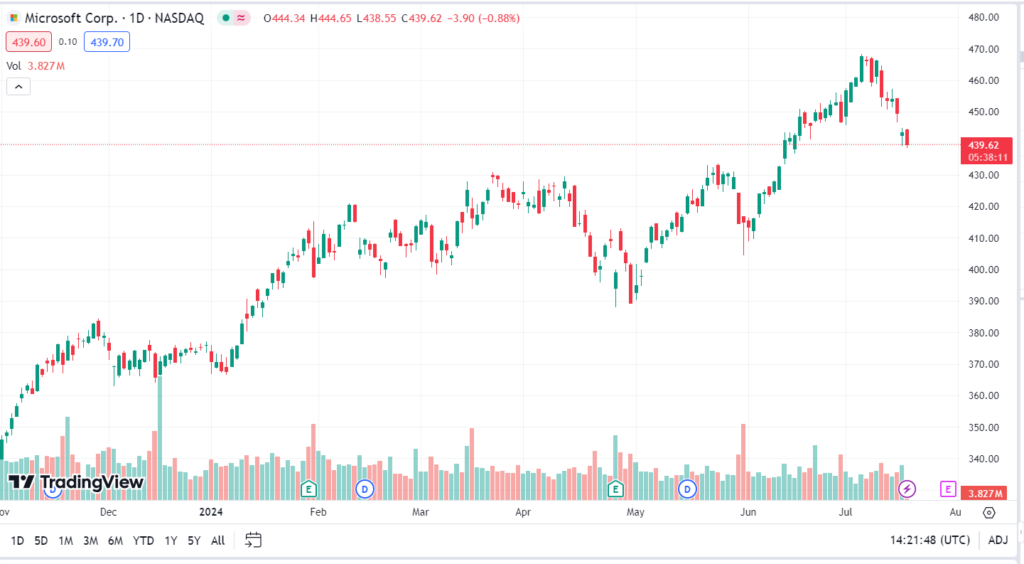As Microsoft Corp (NASDAQ) prepares to announce its fiscal fourth-quarter earnings on Tuesday, July 30, Wall Street analysts are optimistic about the company’s performance.
Microsoft is expected to report strong revenue growth, driven by its Azure cloud services and Office suite, with a projected earnings per share (EPS) of $2.90.
Analysts from Bank of America (BofA) see potential upside in Microsoft’s revenue, highlighting the strength of its key segments.
What does the Wall Street think of Microsoft?
Wall Street analysts forecast Microsoft to post Q4 revenue of $64.2 billion, representing a 14% year-over-year increase.
This growth is largely attributed to the robust performance of Azure and the Office suite, particularly the premium E3 and E5 subscriptions.
The expected EPS of $2.90 underscores Microsoft’s consistent profitability and effective cost management.
BofA analysts project a 1% upside to their revenue estimate of $64 billion, driven by sustained demand for Azure services and an improving PC and Windows environment.
The slight variance in estimates reflects differing views on the impact of emerging technologies and market conditions on Microsoft’s performance.
Azure’s growth driven by AI and core workloads
Azure, Microsoft’s cloud computing platform, remains a critical growth driver for the company. BofA analysts forecast Azure’s growth at 31.5%, up from their base estimate of 30.5%.
This increase is attributed to the platform’s balanced performance across artificial intelligence (AI) and core workloads.
AI continues to be a significant focus for Azure, with enterprises increasingly adopting AI solutions to enhance their operations.
This trend is expected to sustain Azure’s growth momentum, reinforcing Microsoft’s leadership in the cloud services market.
The previous quarter saw Intelligent Cloud, the segment encompassing Azure, achieve a 21% revenue increase, with operating income rising by 32% due to Azure’s expansion.
Office suite and Copilot traction
Microsoft’s Office suite, particularly the premium E3 and E5 subscriptions, is another major contributor to the company’s revenue growth.
BofA analysts anticipate early traction of Microsoft’s Copilot—a generative AI tool integrated into Office applications—will further accelerate growth.
This innovation is poised to enhance productivity and user experience, thereby maintaining the current revenue multiple for Office products.
The Copilot tool leverages AI to assist users with tasks such as drafting emails, generating documents, and analyzing data, which can significantly boost productivity.
This value proposition is likely to drive higher adoption rates, contributing to Microsoft’s top-line growth.
More personal computing and PC market stabilization
In the More Personal Computing (MPC) segment, Microsoft is expected to report $15.5 billion in revenue, with BofA analysts projecting a $50 million upside due to stronger-than-expected PC shipments.
The PC market, which experienced a downturn during the pandemic, is showing signs of stabilization. This recovery supports Microsoft’s sales of Windows licenses and other related products.
The normalization of PC buying patterns is a positive indicator for Microsoft’s MPC segment. As businesses and consumers continue to upgrade their systems, the demand for Windows operating systems and other personal computing products is expected to remain steady.
BoFA analysts see double-digit revenue growth
Looking ahead to fiscal 2025, BofA analysts anticipate continued double-digit revenue growth for Microsoft, driven by sustained strength in Azure and Office products.
However, they also expect a 100 basis point decrease in margins due to increased capital expenditures (capex) driving higher costs of sales. This investment is crucial for expanding Microsoft’s AI capabilities and cloud infrastructure.
The analysts see potential for the Office business to achieve 20% growth by Q1 fiscal 2026, supported by the ongoing adoption of premium subscriptions and AI-driven enhancements.
This optimistic outlook reflects confidence in Microsoft’s ability to capitalize on emerging technological trends and maintain its competitive edge.
MSFT stock performance and valuation
Microsoft shares traded at approximately $440 on Wednesday, reflecting strong investor confidence in the company’s growth prospects.

Source: TradingView
The BofA analysts reiterated their ‘Buy’ rating for Microsoft and raised their price target to $510 from $480, citing the potential for higher Office growth in fiscal 2025.
They believe the current share price reflects a fair amount of near-term upside, given the robust performance and strategic positioning of Microsoft’s key business segments.
The stock’s performance has been bolstered by the company’s consistent execution and strategic investments in growth areas such as cloud computing and AI.
Microsoft’s ability to deliver strong financial results amidst macroeconomic uncertainties underscores its resilience and adaptability.
Focus on AI and strategic investments
Microsoft’s strategic focus on AI and cloud computing is a cornerstone of its growth strategy. The company’s Intelligent Cloud segment, which includes Azure, is projected to achieve growth between 19% and 20% in fiscal Q4, factoring in some impact from AI capacity availability.
This cautious outlook suggests a higher likelihood of meeting expectations, given the strong demand for AI and cloud services.
In the previous quarter, Microsoft achieved a 21% revenue increase in the Intelligent Cloud segment, with operating income rising by 32%. This growth trend underscores the importance of AI and cloud services in driving Microsoft’s long-term success.
The company’s investments in AI infrastructure and capabilities are expected to yield significant returns, reinforcing its leadership in the technology sector.
Microsoft’s fiscal Q4 2024 earnings report is poised to showcase strong revenue growth and consistent profitability, driven by the performance of Azure and the Office suite.
While the company faces challenges such as increased capex and margin pressures, its strategic focus on AI and cloud computing positions it well for sustained growth.
Investors will be closely watching the Q4 results for insights into Microsoft’s future growth trajectory and strategic initiatives.
With a robust outlook for fiscal 2025 and beyond, Microsoft remains a key player in the technology sector, well-positioned to capitalize on emerging trends and maintain its competitive edge.
The post Microsoft Q4 earnings preview: Revenue poised for 14% growth, driven by Azure and Office strength appeared first on Invezz

